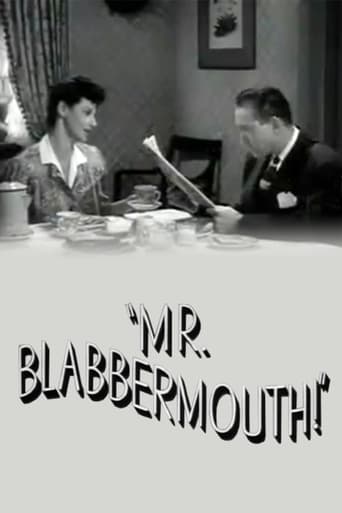

"Mr. Blabbermouth" is a well-crafted propaganda film that uses humor with common sense. It presents solid facts to inform the public about World War II in the Pacific theater. It is MGM's answer to grumbling and defeatism. Rumors and gossip spread among the public after the Japanese attack on Pearl Harbor (Dec. 7, 1941). Unlike some propaganda films, this one avoids any negative implications about the Japanese race or culture. Instead, it tackles head-on claims about Japanese military forces, war production and resources. Those had been widely exaggerated in the rumor mill of the day. This short came with a DVD of "Mrs. Miniver." I found the data it provides very interesting. There had been gossip about Japan's superior war strength, but this 19-minute short showed the data. It gives the numbers for naval strength by Japan and the Allies that had forces in the Pacific. Those included the U.S., Great Britain and the Netherlands. There's no plot to give away in this review, so others may be interested in this data.Japan had 11 battle ships and the Allies had 16 in the Pacific. Japan had nine carrier and the Allies had 7, but the Allied carriers had 100 more planes on their larger ships. Japan had 49 cruisers to 61 for the Allies, 130 destroyers to 163 for the Allies, and 75 submarines to 90 for the Allies. In wartime production, the data just compared Japan with the U.S. Japan was producing 7 million tons of steel yearly, and the U.S. was producing more than 12 times as much - 88 million tons. Japan was producing 24,000 tons of aluminum per year, compared to 400,000 tons yearly in the U.S. And, Japan produced 85,000 tons of copper annually while the U.S. produced 800,000 tons. Comparing the Axis and Allies on energy supplies is as equally lopsided. The Axis countries then (Germany, Japan, Italy, Bulgaria, Hungary, Romania, and Slovakia) controlled 29 percent of the world's coal, while the Allies (Great Britain, the U.S., the Soviet Union, China, and Canada with other nations aligned) controlled 67 percent. And the Axis powers held a mere three percent of the world's oil resources, compared to 97 percent by the Allies. This type of propaganda was hard to beat. It did much to dispel efforts, intended or not, to demoralize and frighten the American public. And, it alerted the public to be wary of people who spout off as experts when they couldn't possibly know more than their listeners.
... View MoreGreat WW2 short.A short movie, made for wartime informational / morale-building purposes. Shows how gossip-mongers undermine the morale of the population, spreading false, negative information and other rumours. Debunks many of the rumours of the time, eg US vs Japanese fleet strengths in the Pacific, and rather methodically sets out the argument that the Allies are stronger, militarily and resources-wise, and will thus win the war.Quite well made and very convincing. Some of it is propaganda but much of it is unadulterated fact. The narration and gossip-mongering scenes are pretty good too, and quite funny at times.
... View MoreThis short subject is typical of the wartime propaganda films warning us against believing all the false rumors spread by the Mr. Blabbermouths in society who want to impress others with their know-it-all attitudes in spreading misinformation.Since we all know people like Mr. Blabbermouth, it's easy to accept the idea that common sense must prevail against this sort of thing if we're to be good citizens. World War II was rife with sayings like: "Loose lips sink ships." Taking a stance against the Mr. Blabbermouths of the world was commonly accepted as the right thing to do.Based on an editorial that appeared in The Los Angeles Daily News, it begins with a blackout during an air raid alarm and shows how the gossipers talked about it the next day, with some of them spreading false rumors implying that the Japanese were better equipped for war since they'd been training for it for years. We then see some amusing sequences of Mr. Blabbermouth spreading his own lies and finally getting his comeuppance from the neighborhood barber who knows how to shut him up.Along the way, the narrator points out how much better equipped the United States was than Japan in terms of military preparations to fight back against the attack with a wealth of aluminum and steel.Amusing and timely, it's done with a sense of humor but teaches a good lesson.
... View MoreWartime or peacetime, the basic idea of this film still applies: "for safety's sake, please engage brain before putting mouth in gear"; and don't assume that the guy you're listening to has followed that rule!As Ray Bolger observed in "The Wizard of Oz" back in 1939, "Some people without brains do an awful lot of talking!" And while such people usually only damage themselves by looking ridiculous in front of people who actually do know something about the subject under discussion, sometimes they do manage to do major damage to others, whether by innocently ruining a reputation over something they've misinterpreted or by "only trying to help!" (case in point on that last: the Mr. Blabbermouth who invited himself along on a camping trip some friends and I had planned--he nearly laced our trail stew with "perfectly harmless wild mushrooms" which my friend D correctly identified as death angel mushrooms and intercepted in the nick of time!)War or no war, Mr. Blabbermouth lives and can be hazardous to your health!
... View More